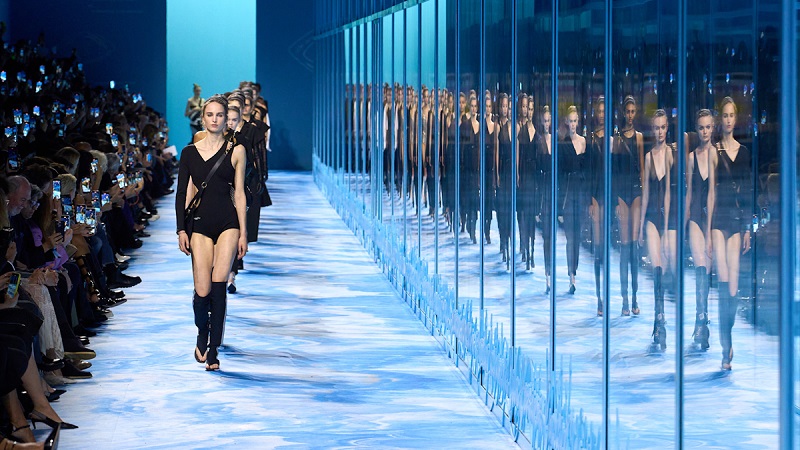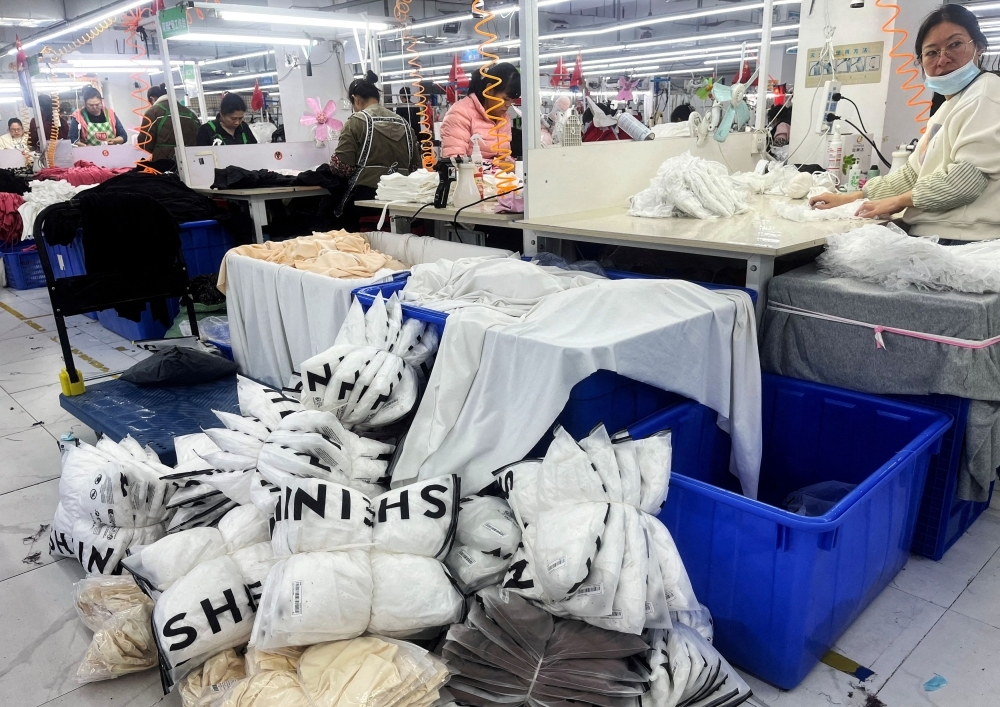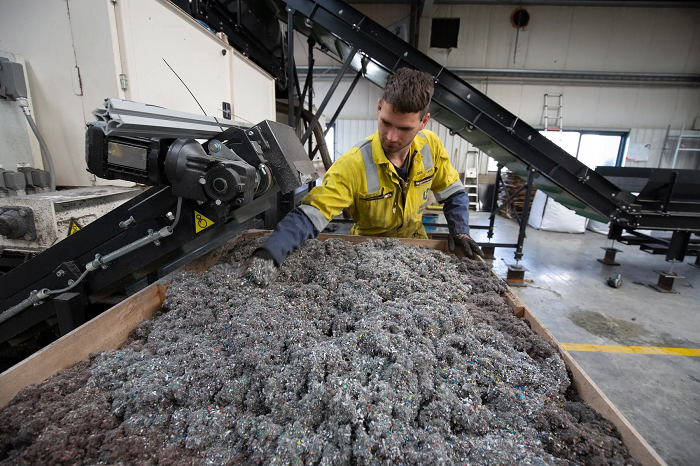FW
"The clothing industry is a major manufacturing sector of Hong Kong. It is the fourth largest manufacturing employer, with 657 establishments hiring 4,763 workers as of March 2017. The major reason for declining exports is relocation of production facilities offshore. In a major upheaval, developed markets, such as the US, the EU and Japan, have started sourcing proudcts from countries, including ASEAN and Bangladesh, thereby hampering the competitiveness of Hong Kong and mainland manufacturers."

Hong Kong’s clothing exports saw 10 per cent decline year-on-year in the first five months of 2017, when re-exports fell by 10 per cent and domestic exports by 46 per cent. In January-May 2017, Hong Kong's clothing exports to the US and EU, the two largest markets that accounted for more than 60 per cent of the total, fell by 9 per cent and 12 per cent, respectively.

The clothing industry is a major manufacturing sector of Hong Kong. It is the fourth largest manufacturing employer, with 657 establishments hiring 4,763 workers as of March 2017. The major reason for declining exports is relocation of production facilities offshore. In a major upheaval, developed markets, such as the US, the EU and Japan, have started sourcing proudcts from countries, including ASEAN and Bangladesh, thereby hampering the competitiveness of Hong Kong and mainland manufacturers. Rising labour costs and stricter environmental regulations on the Chinese mainland have fueled this trend.
Export trends
Hong Kong's clothing exports to the US decreased by 9 per cent in the first five months of 2017, while exports to EU registered 12 per cent decline. EU markets including the UK, Germany, France and Italy witnessed 13-33 per cent de-growth. As a sigh of relief, clothing exports to the Netherlands rose by 7 per cent. Hong Kong’s exports of woven wear fell by 9 per cent year-on-year in the first five months of 2017. Exports of knitwear decreased 10 per cent, whereas clothing accessories and other apparel articles declined 9 per cent and 10 per cent, respectively.
Online shopping gaining might
Online shopping is gaining prominence across the globe and that’s true for Hong Kong as well with major clothing markets, including the mainland China registering 467 million online shoppers in 2016. Recent a PwC survey indicated Chinese consumers are most inclined to online clothing shopping, with more than 72 per cent of the Chinese respondents saying that they prefer buying clothes through the Internet.
The growing variety of online shopping sites such as Taobao in China and ASOS Marketplace in the UK, plus the bloom of group shopping and mobile retailing, is expected to boost online shopping and sales further. The continuous improvement of third party payment such as Alipay by Alibaba Group and WeChat Pay by Tencent also aids in enhanced online shopping. It is estimated that global retail e-commerce sales will more than double from the current level and exceed US$4 trillion by 2020.
The growing variety of online shopping sites such as Taobao in China and ASOS Marketplace in the UK, plus the bloom of group shopping and mobile retailing, is expected to boost online shopping and sales further. The continuous improvement of third party payment such as Alipay by Alibaba Group and WeChat Pay by Tencent also aids in enhanced online shopping. It is estimated that global retail e-commerce sales will more than double from the current level and exceed US$4 trillion by 2020.
Growth regions
Rapid expansion in China’s economy has attracted both Hong Kong and foreign clothing companies. Foreign players including C&A, Uniqlo and H&M are looking to expand in smaller cities, those which are not yet present on mainland are working hard to establish their presence. For instance, Victoria's Secret is set to open a flagship store in Causeway Bay, leveraging Hong Kong as a springboard to go across the border.
As per latest Cotton Incorporated Lifestyle Monitor Survey, 73 per cent of US consumers believed better quality garments are made from natural fibres and 65 per cent of were willing to pay more for it. Besides, most fashion brands are adopting green techniques/designs to increase efficiency and reduce waste in the production process. For instance, H&M has initiated ‘H&M Conscious’, promising more efficient use of natural resources and adoption of 3Rs principle in production while fashion brand G-Star RAW has invented and used in its collections Bionic Yarn, an eco-friendly fabric made of fibers derived from recycled plastic bottles found in the ocean. /span>
Uttar Pradesh is framing a policy for textile, handloom and silk industries. Special incentives will be offered to investors in Bundelkhand, eastern, central and western UP, barring areas under Noida, Greater Noida and Yamuna Expressway Development Authorities. Land will be facilitated for setting up units. Assistance will also be offered in setting up textile complexes, clusters of small and medium units as well as textile parks.
UP which imports two-thirds of textile raw material and textile products aims at promoting all aspects of handloom, textile and sericulture, from production of raw material to preparation of the final product. Uttar Pradesh has a rich history of art and tradition. Fine woven brocades of precious metals from Varanasi and delicate white work, chikankari, zardozi and kamdani from Lucknow are the most famous textiles of Uttar Pradesh.
During the Mughal period, brocade weaving with intricate designs using gold and silver threads became a specialty of Benaras. Uttar Pradesh is known for jamdani weaves. White threads are used to weave on white. The designs woven are visible only on close scrutiny. The thread used to weave the patterns is of the same count as the base material. Gold and silver threads are used to weave the patterns.
A latest fashion retail trend is an altogether quirkier purchasing experience. Japanese retailer Uniqlo has revealed its 'Uniqlo to Go' vending machines, which will appear in US airports from August. Shoppers can purchase items from the brand's 'Lifewear' line via a fluid interface, with clothes then delivered by a robotic arm. Uniqlo indicated the machines may also be rolled out in other locations from shopping malls to movie theaters.
Besides Uniqlo, the New York launch of Alexander Wang's second fashion collection for Adidas Originals who have come up with an interactive retail strategy allowing shoppers to order the clothes via text, using product codes on posters displayed across the city. The orders were then delivered to customers by cyclists dressed in the new collection themselves.
Tommy Hilfiger, also came up with an interactive catwalk experience 'TommyNow'. The two-day fashion show took the form of a fun fair, where customers shopped the collection via interactive screens. In February Hilfiger showcased his second collaboration with supermodel Gigi Hadid in LA, in a similarly exciting setting. This show came with an app titled 'Tommyland Snap:Shop', which meant guests could buy pieces from the collection by simply taking photographs of the models.
Quirky shopping experiences have never been so trendy. At present, Uniqlo, Wang and Hilfiger are in the underground. But Ralph Lauren and Rebecca Minkoff have recently experimented with interactive dressing room mirrors that let customers choose different colors and sizes via a touch-enabled interface. And French beauty brand L'Occitane unveiled its first ‘Smart Beauty Fitting Room', allowing shoppers to browse digitally in private.
Adidas T-shirts will be made using sewbots. This is a major breakthrough in the automation of garment assembly and will enable the production of eight lakh T-shirts a day.
Using cameras to map the fabric and robots to steer it through the sewing needles, the system will handle soft fabrics and make the T-shirts for Adidas on the system which is scheduled to be fully operational by the end of next year.
The technology developed in the US by Atlanta based brand SoftWear Automation, was launched in 2012. It is being used by a Chinese company to supply European sports brand Adidas with T-shirts made in the US by robots. This is a major breakthrough in garment automation. From fabric cutting and sewing to finished product, it takes roughly four minutes. When fully operational, the system will make one T-shirt every 22 seconds.
The sewbots use a combination of patented high-speed computer vision and lightweight robotics to steer fabrics to and through the needle with greater speed and accuracy than a human. With complete automation, the cost for each T-shirt is roughly 33 cents. Around the world, even the cheapest labor market can't compete with this.
Spinexpo to be held in Shanghai from August 29 to 31 will feature latest yarn, fiber, knitwear, knitted fabric and active wear collections. Top Chinese and global companies are ready to present their latest production. For example, China-based Diyang Merino Textile, a high-quality knitter with dyeing and finishing capabilities, will present its latest fabric technology. The company specialises in fine micron merino wool for circular knitting to more than industry customers worldwide, with a focus on outdoors and sportswear markets. The company’s patented technologies Hydro-duct, Wooloft and Merino Ultimate are meant to enhance the unique property of merino wool for outdoor sporting activities.
Aquafil will present Dryarn, an innovative microfiber said to be one of the lightest fibers in the world, water-repellent, breathable, bacteriostatic and dermatologically tested. Dryarn is ideal for a wide range of uses, such as first and second layers of clothing, fashion and sportswear. Dryarn performs best when used in its purest form or in high percentage blends with other raw materials. It can prevent the absorption of moisture and is highly permeable for water vapor. This can give the fiber exceptional breathability: perspiration evaporates quickly without soaking the fabric, thus ensuring that the skin is always dry. Invista is introducing latest Coolmax technology solutions.
US outdoor brand Patagonia is launching a line of workwear made with Iron Forge Hemp canvas, a blend of industrial hemp, recycled polyester and organic cotton which, it is claimed, is more durable, abrasion resistant and comfortable off-the-rack than conventional cotton duck canvas. The workwear is targeted at farmers, builders, ranchers, foresters and environmental activists with a collection of function-specific workwear which uses less harmful materials without sacrificing functionality.
The Patagonia Workwear line is underpinned by the Iron Forge Hemp canvas, a heavy-duty 12.9-oz blend of 55 per cent industrial hemp, 27 per cent recycled polyester and 18 per cent organic cotton. Using the long bast fibres that surround the core of the hemp stalk, Patagonia's Iron Forge Hemp canvas is claimed to be 25 per cent more abrasion resistant than conventional cotton duck canvas.
In addition to the Iron Forge Hemp canvas styles, the Workwear collection offers seven durable, comfortable, utilitarian pieces made with synthetics and natural fibres that provide warmth and protection from the elements.
The eight hemp styles are made in a Fair Trade Certified facility, so for every product made, Patagonia pays a premium directly into a fund that workers can use as they choose. The certification also ensures that the garments are made in a way that meets Fair Trade USA's strict standards for safe and healthy working conditions.
Pakistan is offering incentives for the modernisation and development of textile sector. The aim is to reduce the cost of doing business, leading to a boost in trade and commercial activities. Import of textile machinery will be made easier to enhance the capacity of textile sector. About 16 new varieties of cotton have been introduced.
The high cost of energy has hit the textile industry. Gas and electricity tariffs in Pakistan are around 30 per cent higher compared with regional countries’, rendering Pakistan’s exports uncompetitive in the global market. The industry is also facing a severe liquidity crunch due to delay in payment of sales tax refunds.
The trade deficit for last financial year was recorded at an all-time high of $32.58 billion with exports of $20.45 billion, the lowest since 2009-10. Between fiscal year 2016 and 2017 Pakistan’s exports of textile products fell two per cent. Although raw cotton, cotton yarn and cotton cloth registered a decline in exports, there was an increase in shipments of knitwear, bed wear and readymade garments. Exports to the US fell one per cent. Exports to China fell 15 per cent and to the UK 0.6 per cent. On the other hand, exports to Germany, Belgium and the Netherlands rose.
Techtextil will be held in Mumbai from September 13 to 15, 2017. Contingents from Germany, China, South Korea, Switzerland, Italy, Belarus will present the latest technologies in technical textiles, nonwovens and garment machinery.
Apart from pre-arranged buyer-seller meets, a conference will bring together participants representing the entire cross section and all stakeholders of the industry. It will discuss market outlook, trends, developments, opportunities and challenges in the industry. Specific topics to be highlighted during the event are: protective agrotextiles– advantages and future prospects, textiles in aerospace applications, fiber innovations for functional and value added nonwovens, among others.
Another important feature is the launch of Texprocess Pavilion. Manufacturing technical textiles demands specific raw materials, machinery and equipment that are not readily available in India and importing those materials are expensive. The launch of Texprocess Pavilion give garment machinery manufacturers a great platform to display their innovations and build a new and strong client base while at the same time allowing Indian market to see how these solutions can help expand their existing capabilities.
Covering the entire value chain and displaying latest technologies in technical textiles, nonwoven and garment manufacturing machinery, Techtextil India and Texprocess Pavilion together will aim to be a reliable platform for business and sourcing.
Fi-Tech will take over as Mayer & Cie’s sales and service representative in the United States. i-Tech replaces Mayer Industries. Mayer & Cie expects the handover to boost its presence in the US and provide easier access to new customers. It felt with several employees in the circular knitting department leaving retiring, handing over its US representation to a well-established, professional agency was the right step forward.
Fi-Tech has engaged two senior members of Mayer Industries’ circular knitting team to ensure knowledge and expertise are maintained for several years and to assure the smoothest possible transition.
Fi-Tech was founded in 1972. Its initial focus was on synthetic fibers and nonwovens, but Fi-Tech has since expanded its portfolio substantially and now represents European equipment manufacturers in dyeing, finishing and surface finishing. The geographical focus of its business is on the United States and the NAFTA member-states.
In Mayer & Cie Fi-Tech now has the first greige goods manufacturer in its portfolio. With a circular knitting machine manufacturer Fi-Tech is expanding its portfolio. With its wide-ranging networks Fi-Tech will be able to introduce Mayer beyond the traditional circular knitting machine market.
Germany-based Mayer & Cieis a leading international manufacturer of circular knitting machines.
Shri Damodar Group, a Mumbai-based textile giant, is planning to expand its linen yarn production capacity at Amravati unit. This is to meet the growing demand for linen yarn in India, which is not produced sufficiently within the country and is hence, imported from China., Anuj Biyani, Chairman, Shri Damodar Group point out linen spinning unit at Amravati was started last year with an investment of Rs 90 crores and now they are looking at expanding the same product category in the coming year.
The parent company Shri Damodar Group, Damodar Industries had mentioned in its 2016-17 report that it is setting up an automated fancy linen yarn spinning unit at Amravati. The total cost of the project (including production enhancement plans) is estimated at Rs 140 crores.
The unit is expected to start commercial production by next year. The annual sale from this plant is expected to be around Rs 250 crore. Damodar Industries is well established in textile business with companies like Shri Damodar Yarn Manufacturing, Monopoly Yarns and Golden Fibers.












